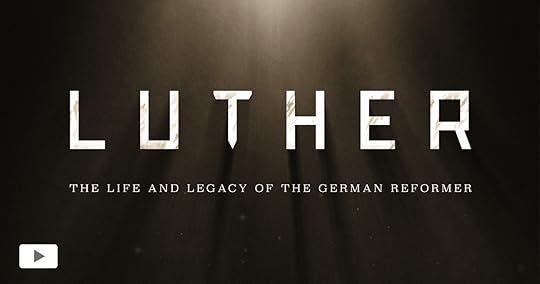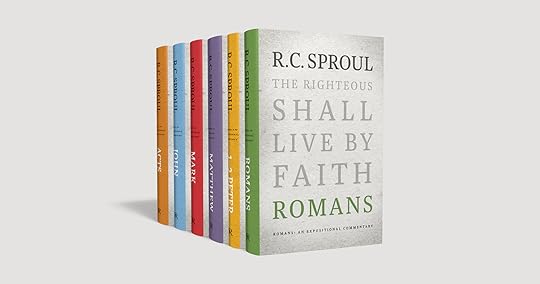R.C. Sproul's Blog, page 114
October 30, 2019
The Greatest Issue We Face

The doctrine of justification is the most controversial issue in the history of Christendom. It was the material cause of the Protestant Reformation, the issue that led to the most serious fragmentation of the Christian church in its history. The debates it raised in the sixteenth century were not over minor details of theology. Both the Roman Catholic Church and the Protestant Reformers understood that what was at stake in the controversy was nothing less than the gospel itself. When, at the Council of Trent in the middle of the sixteenth century, the leaders of the Roman Catholic Church condemned the Reformed doctrine of justification by faith alone and placed their anathema upon it, it was not their intention to place an anathema on the gospel. But if the Reformers were right, then that is exactly what they did, and they thereby anathematized themselves.
Luther declared in the sixteenth century that the doctrine of justification by faith alone is the article upon which the church stands or falls. Calvin used a different metaphor; he said it is the hinge upon which everything turns. At one point, when Luther was engaged in debate with Desiderius Erasmus of Rotterdam, Erasmus turned on Luther and attacked his position. Luther thanked Erasmus for not attacking him on trivial matters and expressed his appreciation that the debate in which they were engaged touched the very heart of the church itself. If Luther’s assessment is true, and justification is the article upon which the church stands or falls, then it follows that justification is the article upon which we stand or fall as individuals. Justification has to do with the justice and righteousness of God. God is just. Biblically, justice is always defined in connection with righteousness. To say that one is just is at the same time to say that one is righteous.
God is the absolute standard of all righteousness. As our Creator, He is also the supreme, sovereign judge of heaven and earth. The Bible clearly indicates that the One who is the judge of all is Himself perfectly just and righteous.
In one sense, that is very good news for us. To live in a world governed by an unjust being would be a dreadful thing to contemplate. We would have no hope for the ultimate triumph of justice in such a world. So it is good news for us that the ruler and judge of all things is Himself good and righteous.
In another sense, that is very bad news for us, because we are not just. The Scriptures make it clear that this just and righteous God has appointed a day in which He will judge the world, including all of us who are not just and righteous.
People today hardly get exercised about the doctrine of justification, which was a matter for which our forefathers were willing to die, and many did die. In Oxford, England, in the sixteenth century, Nicholas Ridley and Hugh Latimer were burned at the stake for their confessed faith in the Reformation doctrines, including the doctrine of justification by faith alone. On a particular street in Oxford, a tiny sign marks the spot where they were executed. I watched people cross the street paying no attention to the mark or to the commemorative plaque. Although people today do not get exercised about a doctrine like justification, it was the issue that changed the whole Western world in the sixteenth century.
Part of the reason for this modern disinterest may be our concept of the last judgment. The idea of a final judgment to which all people will be subjected has all but disappeared from our thinking, and even from the preaching in most of today’s pulpits—despite Jesus’ repeated warning that we all will stand before God, and that every idle word that we speak will be judged.
Here is the dilemma. If God judges people according to His perfect standard of righteousness, then those who are unjust will be in serious trouble. The psalmist asks, “If you, O Lord, should mark iniquities, O Lord, who could stand?” (Ps.130:3).The obvious answer is that no one could stand. We are all guilty of violating the commandments of our Creator, and at some point, we will be called on to stand before His judgment seat.
Even people who believe that there will be a judgment often believe that God is so kind and merciful that He will overlook our sins and grant unilateral pardon and forgiveness, so there is nothing to fear. That idea is foreign to the New Testament. The sober warning of Christ and of the Apostles is that God, in His perfect judgment of us, will judge all men according to their works and will reward the righteous and punish the unrighteous. We can look forward to receiving a reward that corresponds to our merit or punishment for our demerit. That may seem fine until we realize that we have no merit of our own, and that all we will have to offer God on the day of judgment will be our demerits.
The psalmist declares, “Where shall I go from your Spirit? Or where shall I flee from your presence? If I ascend to heaven, you are there! If I make my bed in Sheol, you are there!” (Ps.139:7–8).“You know when I sit down and when I rise up; you discern my thoughts from afar....Even before a word is on my tongue, behold, O Lord, you know it altogether” (vv.2, 4). The Scriptures reveal a God who is omniscient, so He does not need someone to give Him a list of what we have done. He knows everything about our lives.
We must not flee to the popular understanding that when God forgives our sins, He also forgets our sins. When the Scriptures tell us that He remembers our sins no more when He forgives them, the point is not that He has a sudden lapse in His divine memory. Rather, the point is that He does not hold what we have done against us ever again.
God’s forgiveness is not automatic and universal, but it is part of justification. When a person is guilty before a righteous God, there is nothing more important than to understand how that guilt can be removed and how God’s forgiveness can be attained. How can an unforgiven person become forgiven? How can an unjust person be justified or be considered just in the sight of God? There are not many issues in theology more serious than that. The controversy of the sixteenth century boiled down to this: How can we be saved? How can we, as unjust people, possibly be reconciled to a holy and righteous God? This is the greatest issue we face in our entire lives—the question of our personal redemption.
This excerpt is adapted from Truths We Confess by R.C. Sproul. In Truths We Confess, now thoroughly revised and available in a single, accessible volume, Dr. Sproul introduces readers to this remarkable confession, explaining its insights and applying them to modern life. Order the hardcover book today.


October 29, 2019
Luther's Legacy in Song
Martin Luther believed that music was second only to Scripture in its ability to elevate the soul. In this brief clip, R.C. Sproul, W. Robert Godfrey, Steven Lawson, and Stephen Nichols discuss some of Luther’s most famous and heartfelt hymns.
This Reformation Month, watch a short video every day on the history and insights of the Protestant Reformation. And don't forget that for this month only, you can request your free digital download of R.C. Sproul’s video teaching series Luther and the Reformation plus the ebook edition of The Legacy of Luther, edited by R.C. Sproul and Stephen Nichols at ligm.in/Reformation. Offer ends October 31, 2019.
Transcript
R.C. Sproul: Sacred music was an integral part of Luther’s background as a monk. Once he came out of the monastery, he still had a profound appreciation for the importance of church music. In fact, he said second only to the Bible, the Word of God, is the importance of music because music has the singular ability to elevate the soul.
Steven Lawson: Well, in Luther’s day, the worship service had become dead because the spiritual leaders were spiritually dead, the people were spiritually dead, and there was a dead profession of faith in the church. When Luther burst onto the scene, he brought the life of the truth of the gospel with him. Such theology revolutionized the doxology in the church. People now are alive unto God under the preaching of the Word of God. Their hearts began to overflow with anthems of praise for God. It is high doctrine that always promotes high devotion to God. Luther was responsible for this. Luther himself began to write hymns, and they were expressions of his great love for Scripture and love for God. So for example, when the Black Plague swept through Europe, he chose to stay in Wittenberg and to minister to the people who were suffering. In the midst of that crisis, he wrote that great hymn “A Mighty Fortress Is Our God.” It was the direct result of meditating upon Psalm 46. God had become a stronghold and a refuge for him in his hour of greatest need.
R.C. Sproul: When things would be difficult at the University of Wittenberg, Melanchthon, Luther's closest lieutenant, tried to rally the discouraged professors and would say, “Gentlemen, let’s sing the 46th,” meaning “A Mighty Fortress Is Our God.” That song, of course, has come down to our day.
W. Robert Godfrey: One of the convictions of Luther is that singing would be a great way for people to know God's truth. For that reason, he wrote hymns, and the Lutheran tradition encouraged the use of hymns, the development of hymns.
Stephen Nichols: My favorite hymn of Luther’s is a hymn called “Christ Jesus Lay in Death’s Strong Bands.” In that hymn, Luther actually plays off of a medieval saying. If they had bumper stickers in the Middle Ages, this would have been a bumper sticker. The saying was this: “In the midst of life—media vita in morte sumus—in the midst of life we are in death.” It’s a terrible worldview. Talk about the effect of the Middle Ages on the people. Doesn’t that show the hopelessness that was there on the eve of the Reformation, that they’re saying in the midst of life we die? Here’s what Luther does in that hymn—and it shows how clever he is, and it also shows what a great theologian he is—in that hymn, Luther turns it around. He says, “No, the truth is in the midst of death we live.”


Stream the Luther Documentary for Free

More than five hundred years ago, Martin Luther nailed his Ninety-Five Theses to the Castle Church door in Wittenberg. Little did he know how the Lord would use him to ignite a movement that would change the world.
For a limited time, you can stream Luther: The Life and Legacy of the German Reformer for free on Ligonier’s YouTube channel. Celebrate Reformation Week by remembering the events God used in Luther’s life that led him to rediscover the gospel of justification by grace alone, through faith alone, in Christ alone. Tell your friends about this film or watch it together.
To dig even deeper into Luther’s story and significance, you can also download Ligonier’s free accompanying study guide.
“With a holy boldness, Martin Luther took his stand contra mundum, against the world.” —R.C. Sproul


Participate in Your Church
Here’s an excerpt from Participate in Your Church, Larry G. Mininger's contribution to the October issue of Tabletalk:
Young people, is this your story? You were raised in your family’s church and were very involved in it when you were a kid and maybe through high school. But when you left for college or the military or to take a job far from home, you became much less involved in any church.
You did not plan to do this, but you had new responsibilities and demands on your time. You were free from old patterns and on your own to form new ones. Maybe you shopped around for a church that “fit your needs”—one that had a lot of people your age or music you enjoyed or a great preacher. You missed worship due to heavy school or work demands, but you still loved Jesus and prayed and watched worship services on TV or your computer. You just did not get plugged into a church.
Let me encourage you with two biblical thoughts.
First, Jesus has a plan for you and for every Christian. His plan is to have all Christians immersed in and cared for by His church. He revealed His plan to His disciples in Matthew 16:18–19: “I tell you, you are Peter, and on this rock I will build my church, and the gates of hell shall not prevail against it.” So, Jesus personally founded, authorized, and gave structure to this plan when He said, “I will give you [the Apostles] the keys of the kingdom of heaven, and whatever you bind on earth shall be bound in heaven, and whatever you loose on earth shall be loosed in heaven.”
Continue reading Participate in Your Church, or begin receiving Tabletalk magazine by signing up for a free 3-month trial.
For a limited time, the new TabletalkMagazine.com allows everyone to browse and read the growing library of back issues, including this month’s issue.


October 28, 2019
One Week Only: Save 50% on R.C. Sproul’s Expositional Commentary Set

Dr. R.C. Sproul’s expositional commentaries are now available from Reformation Trust. For a limited time, you can save 50% when you order the entire series for only $90.
As the founding pastor of Saint Andrew’s Chapel in Sanford, Fla., R.C. Sproul adopted the ancient practice of preaching through entire books of the Bible. This manner of preaching, called lectio continua or “continuous exposition,” was recovered in the sixteenth century and became the preferred method of many of the Reformers, including Martin Luther and John Calvin.
Drawn from decades of careful study and delivered from a pastor’s heart, R.C. Sproul’s expositional commentaries can help you to understand key theological themes and apply them to all areas of life. Here is your opportunity to learn from a trusted teacher and theologian as he leads you through God’s Word and shares his perspective on living faithfully for God’s glory.
This collection includes Matthew, Mark, John, Acts, Romans, and 1–2 Peter.
Available now from ReformationTrust.com

R.C. Sproul was founder of Ligonier Ministries, founding pastor of Saint Andrew’s Chapel in Sanford, Fla., and first president of Reformation Bible College. He was author of more than one hundred books, including The Holiness of God.


Justified by Faith
What does it mean to be justified by faith alone? In this brief clip, R.C. Sproul looks at the instrument that links us to Jesus.
This Reformation Month, watch a short video every day on the history and insights of the Protestant Reformation. And don't forget that for this month only, you can request your free digital download of R.C. Sproul’s video teaching series Luther and the Reformation plus the ebook edition of The Legacy of Luther, edited by R.C. Sproul and Stephen Nichols at ligm.in/Reformation. Offer ends October 31, 2019.
Transcript:
When we say that justification is by faith, we are talking about the instrumental dative—the means by which a person is justified. Justification by faith simply means that the instrument of our justification is that with faith, and by faith, and through faith we are linked to Jesus so that all that He is and all that He has done is given to us.


Does "Semper Reformanda" Mean That the Church Should Always Be Changing?

Seeking reformation in the church is not the same as chasing after novelty. From Ligonier’s Reformation 500 event, R.C. Sproul and Sinclair Ferguson help us to understand the intended meaning behind the Latin slogan, “Semper Reformanda.”
To get real-time answers to your biblical and theological questions, just Ask.Ligonier.org.
Read the Transcript


Four Implications of Martin Luther’s Theology

What do the sovereignty of God, salvation by grace, justification by faith, and new life in union with Christ mean for the living of the Christian life? For Martin Luther, they carry four implications:
The first implication is the knowledge that the Christian believer is simul iustus et peccator, at one and the same time justified and yet a sinner. This principle, to which Luther may have been stimulated by John Tauler's Theologia Germanica, was a hugely stabilizing principle: in and of myself, all I see is a sinner; but when I see myself in Christ, I see a man counted righteous with His perfect righteousness. Such a man is therefore able to stand before God as righteous as Jesus Christ—because he is righteous only in the righteousness that is Christ's. Here we stand secure.
The second implication is the discovery that God has become our Father in Christ. We are accepted. One of the most beautiful accounts found in Luther's Table Talk was, perhaps significantly, recorded by the somewhat melancholic, yet much loved, John Schlaginhaufen:
God must be much friendlier to me and speak to me in friendlier fashion than my Katy to little Martin. Neither Katy nor I could intentionally gouge out the eye or tear off the head of our child. Nor Could God. God must have patience with us. He has given evidence of it, and therefore he sent his Son into our flesh in order that we may look to him for the best.
Third, Luther emphasizes that life in Christ is necessarily life under the cross. If we are united to Christ, our lives will be patterned after His. The way for both the true church and the true Christian is not via the theology of glory (theologia gloriae) but via the theology of the cross (theologia crucis). This impacts us inwardly as we die to self and outwardly as we share in the sufferings of the church. The medieval theology of glory must be overcome by the theology of the cross. For all their differences in understanding the precise nature of the sacraments, Luther and Calvin are at one here. If we are united with Christ in His death and resurrection, and marked out thus by our baptism (as Paul teaches in Rom. 6:1–14), then the whole of the Christian life will be a cross-bearing:
The Cross of Christ doth not signify that piece of wood which Christ did bear upon his shoulders, and to the which he was afterwards nailed, but generally it signifieth all the afflictions of the faithful, whose sufferings are Christ's sufferings, 2 Cor. i.5: "The sufferings of Christ abound in us"; again: "Now rejoice I in my sufferings for you, and fulfil the rest of the afflictions of Christin my flesh, for his body's sake, which is the Church" &c. (Col. i.24). The Cross of Christ therefore generally signifieth all the afflictions of the Church which it suffereth for Christ.
The believer's union with Christ in His death and resurrection and its outworking in daily experience thus became, for Luther, the spectacle lenses through which the Christian learns to view every experience in life. This—the theologia crucis—is what brings everything into sharper focus and enables us to make sense of the ups and downs of the Christian life:
It is profitable for us to know these things, lest we should be swallowed up with sorrow or fall to despair when we see that our adversaries do cruelly persecute, excommunicate and kill us. But let us think with ourselves, after the example of Paul that we must glory in the cross which we bear, not for our sins, but for Christ's sake. If we consider only in ourselves the sufferings which we endure, they are not only grievous but intolerable; but when we may say: "Thy sufferings (O Christ) abound in us"; or, as it is said in Psalm xliv: "For thy sake we are killed all the day," then these sufferings are not only easy, but also sweet, according to this saying: "My burden is easy, and my yoke is sweet" (Matt. xi.30).
Fourth, the Christian life is marked by assurance and joy. This was one of the hallmarks of the Reformation, and understandably so. The Reformation's rediscovery regarding justification—that, instead of working toward a hoped-for arrival at it, the Christian life actually begins with it—brought stunning deliverance, filling mind, will, and affections with joy. It meant that one could now begin to live in the light of a settled future in glory. Inevitably, that light reflected back into the present life, bringing intense relief and release.
For Luther, the Christian life is a gospel-grounded, gospel-built, gospel-magnifying life that exhibits the free and sovereign grace of God and is lived out in gratitude to the Savior who died for us, yoked to Him in cross-bearing until death is swallowed up in victory and faith becomes sight.
Perhaps, in 1522, as they sat listening to Luther preaching one Sunday in the church at Borna, some of his congregation wondered what lay at the heart of this gospel that had so excited, not to say transformed, Brother Martin. Could it possibly be for them too? Luther had read their minds. He had come into the pulpit well prepared to answer their question:
But what is the Gospel? It is this, that God has sent his Son into the world to save sinners, Jn. 3, 16, and to crush hell, overcome death, take away sin and satisfy the law. But what must you do? Nothing but accept this and look up to your Redeemer and firmly believe that he has done all this for your good and freely gives you all as your own, so that in the terrors of death, sin and hell, you can confidently say and boldly depend upon it, and say: Although I do not fulfil the law, although sin is still present and I fear death and hell, nevertheless from the Gospel I know that Christ has bestowed on me all his works. I am sure he will not lie, his promise he will surely fulfil. And as a sign of this I have received baptism.
Upon this I anchor my confidence. For I know that my Lord Christ has overcome death, sin, hell and the devil for my good. For he was innocent, as Peter says: "Who did no sin, neither was guile found in his mouth." 1 Pet. 2, 22. Therefore sin and death were not able to slay him, hell could not hold him, and he has become their Lord, and has granted this to all who accept and believe it. All this is effected not by my works or merits; but by pure grace, goodness and mercy.
Luther once said, "If I could believe that God was not angry at me, I would stand on my head for joy." Perhaps that very day some of those who heard him preach responded and experienced the "confidence" of which he spoke. Who knows but some of the younger hearers later wrote to their friends in turn and told them that they had gone home and stood on their heads for joy?
This excerpt is taken from Sinclair Ferguson's contribution in The Legacy of Luther.


October 27, 2019
Martin Luther in His Own Words
After years of struggling with his guilt, Martin Luther finally realized that righteousness is not something he could achieve, but rather a gift of God. In this brief clip, Michael Reeves reads Luther’s account of being born again.
This Reformation Month, watch a short video every day on the history and insights of the Protestant Reformation. And don't forget that for this month only, you can request your free digital download of R.C. Sproul’s video teaching series Luther and the Reformation plus the ebook edition of The Legacy of Luther, edited by R.C. Sproul and Stephen Nichols at ligm.in/Reformation. Offer ends October 31, 2019.
Transcript
Looking at that verse which says, “the righteous will live by faith” he said; “Though I lived as a monk without reproach, I felt I was a sinner before God with an extremely disturbed conscious, and I could not believe that God was placated by my satisfaction. Thus, I raged with a fierce and troubled conscious. Nevertheless, I beat importunately upon Paul at that place, Romans 1:17 ardently desiring to know what’s it Paul wanted, and I began to understand that the righteousness of God is that by which the righteous live by a gift of God, mainly by faith. The righteousness of God is revealed by the gospel, a passive righteousness by which the merciful God justifies us by faith. Here I felt, I was altogether born again.”


October 26, 2019
The Article on Which the Church Stands or Falls
If you don't have justification by faith alone, you don't have the gospel. In this brief clip, R.C. Sproul looks at the article on which the church stands or falls.
This Reformation Month, watch a short video every day on the history and insights of the Protestant Reformation. And don't forget that for this month only, you can request your free digital download of R.C. Sproul’s video teaching series Luther and the Reformation plus the ebook edition of The Legacy of Luther, edited by R.C. Sproul and Stephen Nichols at ligm.in/Reformation. Offer ends October 31, 2019.
Transcript
The doctrine of justification by faith alone is the article upon which the church stands or falls. The article that is so important that he said, that if we lose it, we lose Christianity. If you don’t have the doctrine of justification by faith alone, you don’t have the gospel, and if you don’t have the gospel, the church has no reason to exist. The church itself ceases to be a church and falls into apostasy because it is the article that answers the question, what must I do to be saved?


R.C. Sproul's Blog
- R.C. Sproul's profile
- 1931 followers




